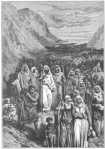From Exodus 22-24
 In today’s passage the LORD teaches Moses about property law and restitution. Restitution is the return of something lost or stolen so that the original situation is restored.
In today’s passage the LORD teaches Moses about property law and restitution. Restitution is the return of something lost or stolen so that the original situation is restored.
This post is part of my bible in a year series.
Passage and Comments
Moses is still on Mount Sinai recording the Law. This particular section is about property.
22 “If a man steals an ox or a sheep, and kills it or sells it, he shall repay five oxen for an ox, and four sheep for a sheep. (Ex 22.1)
The main form of currency in those days was cattle. Thieves would come and steal cattle.
Greater restitution is demanded for the greater theft.
2 If a thief is found breaking in and is struck so that he dies, there shall be no bloodguilt for him, 3 but if the sun has risen on him, there shall be bloodguilt for him. He shall surely pay.
If he [the thief] has nothing [to make restitution with], then he shall be sold [into slavery] for his theft. 4 If the stolen beast is found alive in his [the thief’s] possession, whether it is an ox or a donkey or a sheep, he shall pay double. (Ex 22.2-4)
 The thief operates in the night. The one who is awakened, is in a condition of defense. He must protect his family and property. The owner could kill the thief.
The thief operates in the night. The one who is awakened, is in a condition of defense. He must protect his family and property. The owner could kill the thief.
There are laws about killing others. Some about murder, others manslaughter. When one person murders another they incur ‘bloodguilt’.
The text makes a distinction over whether the thief was killed during the night or the day. The logic behind this law seems to be that if the intruder is identifiable, justice should go through the proper channels.
If the thief is identified and found. The thief has to repay what they have stolen or be sold into slavery.
5 “If a man causes a field or vineyard to be grazed over, or lets his beast loose and it feeds in another man’s field, he shall make restitution from the best in his own field and in his own vineyard. (Ex 22.5)
‘If a man causes’. He deliberately led his cattle into his neighbor’s field to feed.
6 “If fire breaks out and catches in thorns so that the stacked grain or the standing grain or the field is consumed, he who started the fire shall make full restitution. (Ex 22.6)
People are instructed to be careful when using fires to clear out undesirable plants. They become responsible for the damage they cause.
God teaches the people to be responsible for what they do.
7 “If a man gives to his neighbor money or goods to keep safe, and it is stolen from the man’s house, then, if the thief is found, he shall pay double.
8 If the thief is not found, the owner of the house shall come near to God to show whether or not he has put his hand to his neighbor’s property.
9 For every breach of trust, whether it is for an ox, for a donkey, for a sheep, for a cloak, or for any kind of lost thing, of which one says, ‘This is it,’ the case of both parties shall come before God. The one whom God condemns shall pay double to his neighbor. (Ex 22.7-9)
If they cannot find a thief then suspicion will fall on the one looking after the money or goods.
They come near to God in the tabernacle.
They bring their case before the priests to decide. They may search each person’s property. If they find it. God condemns the guilty party.
10 “If a man gives to his neighbor a donkey or an ox or a sheep or any beast to keep safe, and it dies or is injured or is driven away, without anyone seeing it,
11 an oath by the LORD shall be between them both to see whether or not he has put his hand to his neighbor’s property. The owner shall accept the oath, and he shall not make restitution.
12 But if it is stolen from him, he shall make restitution to its owner.
13 If it is torn by beasts, let him bring it as evidence. He shall not make restitution for what has been torn. (Ex 22.10-14)
What happened to the man’s property? Was it stolen, sold or was it killed by wild beasts?
The law of Moses handled everyday happenings for the Hebrews.
14 “If a man borrows anything of his neighbor, and it is injured or dies, the owner not being with it, he shall make full restitution. 15 If the owner was with it, he shall not make restitution; if it was hired, it came for its hiring fee. (Ex 22.14-15)
The law of Moses decides who is most responsible for the property.
Story of Israel

Restitution is the return of something lost or stolen so that the original situation is restored. As we’ve seen in the above passage restitution is required for crimes committed (Lev 6.1-6; Num 5.6-7; Eze 33.14-14), for accidental loss, unintentional sin (Lev 5.14-16), as part of confession (Num 5.5-7) and in cases of misplaced accusation (Ps 69.4). The amount of restitution always exceeds the amount stolen (Lev 6.5; 2 Sam 12.5-6; Prov 6.31).
Story of Jesus
Making restitution is clearly important when owning up to the consequences of sin. In the gospel a tax collector named Zacchaeus made restitution.
19 He entered Jericho and was passing through. 2 And behold, there was a man named Zacchaeus. He was a chief tax collector and was rich. 3 And he was seeking to see who Jesus was, but on account of the crowd he could not, because he was small in stature. 4 So he ran on ahead and climbed up into a sycamore tree to see him, for he was about to pass that way.
5 And when Jesus came to the place, he looked up and said to him, “Zacchaeus, hurry and come down, for I must stay at your house today.” 6 So he hurried and came down and received him joyfully. 7 And when they saw it, they all grumbled, “He has gone in to be the guest of a man who is a sinner.”
8 And Zacchaeus stood and said to the Lord, “Behold, Lord, the half of my goods I give to the poor. And if I have defrauded anyone of anything, I restore it fourfold.” 9 And Jesus said to him, “Today salvation has come to this house, since he also is a son of Abraham. 10 For the Son of Man came to seek and to save the lost.” (Lk 19:1–10)
Jesus accepts sinners, even those hanging from trees. He came to seek and save the lost. His acceptance changes people.
Zacchaeus was convicted of the wrong he had done and desired to make up for it. He vowed to restore it fourfold (Ex 22.1).
Copyright © Joshua Washington and thescripturesays, 2016. All Rights Reserved.





